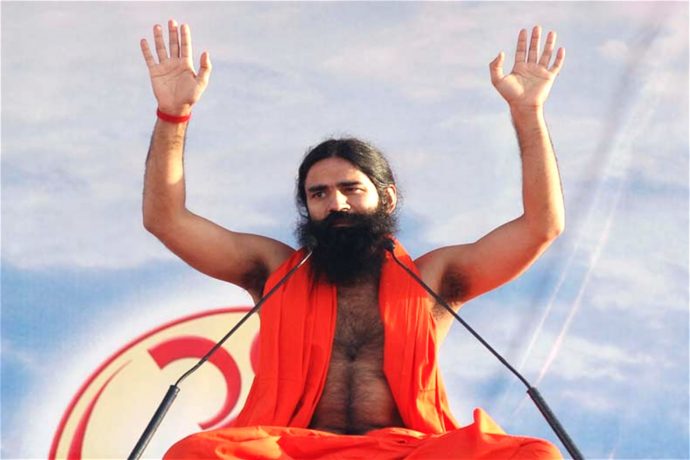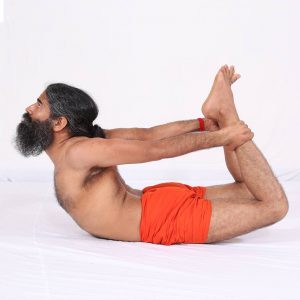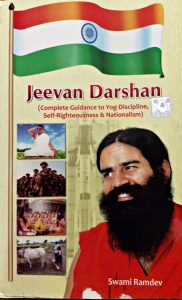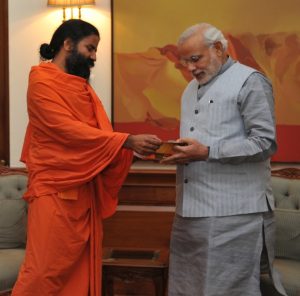The single most influential yoga teacher in India, if not the world, is a right-wing activist who campaigns against homosexuality, promotes Islamophobia, and advocates for religious nationalism.
He’s also really into herbal remedies and natural foods.
You may find this bizarre. In the United States, yoga and organics seem solidly in the domain of political progressives. Sure, the natural foods movement has its libertarian streak, and Republicans do attend yoga classes, but the holism-seeking scene that enjoys warrior poses and ayurvedic ear drops is heavily urban, educated, and liberal.
The ethos with which they’re engaging, though, is not. It’s easy to miss, but some of the very things that animate this American wellness culture—the obsession with purity, the nostalgia for a glorified, pre-industrial past, the pride in the local—lend themselves well to conservative religious nationalism.
This is partly what makes the Indian yoga teacher and mega-celebrity Baba Ramdev such a fascinating figure. He is at once a source, reflection, and distortion of so much that feels familiar in American culture.
Today, Ramdev is both a monastic and an entrepreneur. He is a proponent of all-natural products and a Hindu nationalist. He’s a TV star. He has a following of millions. He’s getting ready to open a university and a network of schools. And in the past few years, he has emerged as a major ally of India’s ruling right-wing party. It’s no stretch to describe Ramdev as a kind of Jerry Falwell of India—a Falwell that wears saffron robes and teaches yoga.
Ramdev’s rise illustrates a worrying turn in Indian politics. But it can also help us understand the appeal of nationalism in the 21st century, and to see the unexpected connections among wellness culture, natural products, and right-wing politics.
Gooseberries and homophobia
Baba Ramdev got his start as a public figure in the traditional way: with a TV show. His story involves a gooseberry farm, a hunger strike, a murder, a cross-dressing escapade, a political revolution, and thousands upon thousands of gallons of clarified butter.
In 2003, Ramdev was offering yoga shivirs—essentially, camps—to large audiences in the holy city of Haridwar when he took over the daily morning yoga program on Aastha TV, “India’s leading Socio-Spiritual-Cultural Television Network.” The guru’s two hour-long show quickly became the most popular TV program, of any kind, in India, attracting more than 25 million viewers on an average morning. (For comparison, that’s five times the viewership of Good Morning America).
Ramdev hosted even bigger yoga camps. He traveled the world. He taught yoga to Bollywood stars.
The guru-entrepreneur is a familiar figure in India, and Ramdev is part of a wave of spiritual leaders who present yoga postures as a therapeutic fitness method. Few, though, have managed to achieve anything close to his prominence.
Partly, that’s because of the gooseberries. As the origin story goes, a group of gooseberry farmers visited Ramdev in 2005 and told him that their farms were going to be destroyed. There wasn’t enough demand for the fruit. In response, Ramdev started a small operation to make alma, or gooseberry juice. Business boomed, and before long he and a partner, the ayurvedic guru Acharya Balkrishna, started a company, Patanjali Ayurved, and began selling other goods.
It’s difficult to confirm this story (and after an initial reply from a spokesperson, Patanjali Ayurved did not respond to multiple interview requests), but the results are apparent all over India. According to a 2015 report from an equity research firm, the company has 200,000 outlets, most of them small, unofficial vendors selling everything from spices to instant noodles to clarified butter, Patanjali’s flagship product. With Ramdev as the spokesperson, sales are projected to hit one billion dollars in the 2017 fiscal year. (Ramdev claims not to have any direct financial stake in Patanjali Ayurved since he is, technically, a Hindu renouncer).
For American observers, the frank alliance between spirituality and capitalism here can be a bit jarring. Clergy in the United States tend not to appear in TV commercials. Then again, plenty of religious figures make aggressive financial appeals, and plenty of commercial icons seem to have a spiritual vibe.
In the case of Ramdev, it’s hard to disentangle the commercial from the spiritual–and it’s hard to disentangle both from the political.
Ramdev got started in politics by campaigning against corruption. He held hunger strikes in Delhi in 2011 and 2012, which did not endear Ramdev to the ruling Congress Party. A contingent of police broke up a public protest and kicked Ramdev out of the city after the ninth day of his 2011 strike. They tracked him down even after he tried to escape dressed as a woman. (Ramdev was caught when police noticed his beard, which the guru had tried to hide under a dupatta).
Police efforts to break up the protest, which included killing at least one protester, attracted global attention and validated Ramdev’s claims of government corruption.
Ramdev’s anti-corruption measures have helped make him politically prominent, but it’s his homophobia that may prove to have the more lasting effect. Ramdev entered sexual politics in 2006, when he claimed he could treat HIV/AIDS patients using yoga and ayurvedic medicine. He has prescribed yoga as a cure for the disease of homosexuality, which, he suggests, is in conflict with the Indian family and Vedic culture.
In 2009, after the Delhi High Court decided to decriminalize homosexuality, Ramdev was instrumental in pressuring them to reverse that decision, which the Court did in 2013. The guru celebrated with a public response that described homosexuality as “unscientific,” “unnatural,” “uncivilized,” “immoral,” “irreligious,” and “abnormal.”
Today, Ramdev and his vision of ayurveda and yoga wield more power, influence, and authority than ever before. This new influence was recently on display in the small coastal state of Goa, where the state’s ’s Minister for Sports and Youth Affairs, Ramesh Tawadkar, announced that the government plans to host a program to “cure” young gay people of what are perceived as deviant sexualities. The Minister explained that the government would work with Ramdev to incorporate the guru’s yogic methods into the gay-reversal program. In a New York Times interview following the announcement, Tawadkar warned, “We will definitely use law as a tool to teach them what is right and what is wrong.”
Purity politics
If there’s a single theme that unifies Ramdev’s work, it’s the quest for purity—pure foods, pure medicines, pure sexuality, pure politics, and a pure Indian nation. “Because of pollution in food, thought, mind and behaviour, disease, fear, corruption, crime and anarchy are spreading in the entire country,” writes Ramdev in Jeevan Darshan (Complete Guidance to Yog-Discipline, Self-Righteousness & Nationalism), a booklet translated and published by his yoga trust.
Here in the 21st century, purity politics still has its appeal. Just witness the success of Donald Trump’s nativist rhetoric, with its promise to scrub America free of foreign contagion (and sometimes protect it from actual illness). Or look at the way that American activists have marshaled fear of contamination into powerful movements against vaccines, fluoride, and GMOs.
Those same politics seem to succeed in India, the world’s largest democracy, and perhaps its most religious. Ramdev’s rise has been closely tied to the ascent of Prime Minister Narendra Modi and his Hindu nationalist Bharatiya Janata Party (BJP), which took power in 2014.
For those who imagine India as a land of Gandhi fans, it’s worth remembering that it was a member of the Rashtriya Swayamsevak Sangh (RSS), a right-wing Indian paramilitary organization that now comprises the BJP’s activist wing, that assassinated Mahatma Gandhi in 1948. Although the BJP has been a force in national politics for years, it has probably never been more powerful.
Under Modi, India has seen sustained economic growth (along with some massive protests). At the same time, the party has created a more unstable climate for India’s Christian and Muslim minorities, with rumors of forced conversions to Hinduism, government policies hostile to non-Hindus, and eruptions of violence, both verbal and physical, against Muslims.
Ramdev’s brand of religious activism and entrepreneurship fits right in with this political moment, and he has lent his spiritual authority to Modi’s office, as well as to some of his causes.
This past spring, in perhaps his most violent publicity stunt yet, Ramdev said that only a respect for the Indian law kept him and his followers from decapitating hundreds of thousands of Muslims for refusing to recite the Hindu nationalist mantra “Bharat Mata Ki Jai,” meaning Honor to Mother India. (Some Indian Muslims consider the mantra incompatible with their religious commitments, since it personifies India as the Goddess).
The consequences of a sustained campaign against India’s religious minorities could be devastating: India has more than 200 million religious minorities, the majority of them Muslims. Alone, they would form the sixth largest country in the world.
Ramdev’s affiliation with the BJP may be strategic in addition to ideological. Ramdev has dozens of legal cases outstanding against him and his holdings, and last year, during a labor dispute, a truck driver was murdered on Patanjali’s Haridwar campus. Ramdev’s brother was involved in the incident. Having close connections with the party in power can’t hurt.
“Our yoga guru Ramdev was the first one outside of BJP to campaign for Narendra Modi,” said Swami Agnivesh, a religious leader who has known Ramdev for more than a decade, and who has condemned his Islamophobic remarks. “He needed someone in power who would shield him against all possible legal investigations and charges.”
Ramdev’s involvement with Modi has been so substantial that it earned him protection under the central government. Since 2014, a large round-the-clock team of Central Reserve Police Force personnel have protected Ramdev. And in 2015, Central Industrial Security Force commandos began providing security to Ramdev’s Patanjali Yogpeeth campus in Haridwar.
The newest kind of old
There’s a kind of a paradox in Ramdev’s work—one that may sound familiar to many observers of the American right-wing.
On the one hand, Ramdev’s stance seems fundamentally nationalist and conservative. He makes an appeal to traditional, natural foods and traditional, wholesome religious practices. He consistently positions Patanjali Ayurved as a scrappy homegrown company, fighting against global multinational competitors. His company’s logo and packaging use the orange, white, and green of the Indian flag, and while packaging information is written in English, it says MADE IN BHARAT, using the country’s Hindi name, rather than MADE IN INDIA.
At the same time, Ramdev is himself building a massive company. He sells packaged, branded food with sleek modern labeling, and he thrives in a health-and-wellness sector that’s linked to India’s growing, global-facing middle class.
The politician to whom he has tied his fortunes, Narendra Modi, is a neoliberal who is trying to accelerate India’s entry into the 21st century capitalist global economy. For all the traditionalism of their rhetoric, these guys are also playing a modern game.
This is a very modern, very urban flavor of conservatism. It is not traditional. It thrives on nostalgia about the rural world and fear of lost cultural norms, as well as modern narratives about self-care, personal improvement, and the value of pleasure. In other words, in an urbanizing world with a growing middle class, it is a flavor of politics that may be uniquely suited to global trends.
An entrepreneur-guru like Ramdev might seem exotic to many American onlookers. But in some ways, he’s one expression of this global shift—a shift that’s perhaps related to the success of Donald Trump and the Brexit campaign—in favor of various forms of xenophobia, nationalism, and even patriarchy.
It’s easy to think of religious nationalism as a fringe position, or as an outdated throwback. Ramdev’s prominence today, as with the prominence of the BJP more generally, is a reminder that the opposite is true: that modern, and often neoliberal, trends can feed into conservative, nationalist sentiments; that globalization can actually drive backlash against progressive ideals; and that perhaps even more so in a shifting and modernizing world, there will be a profound, sometimes violent draw toward purity.
* * *
Also on The Cubit: The sex scandal following Whole Foods’ spiritual leader
Follow The Cubit, RD’s religion and science portal, @TheCubit








